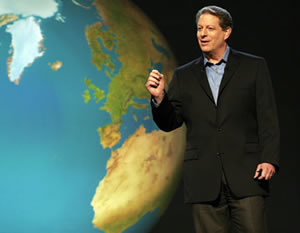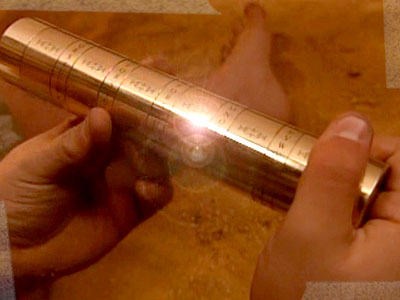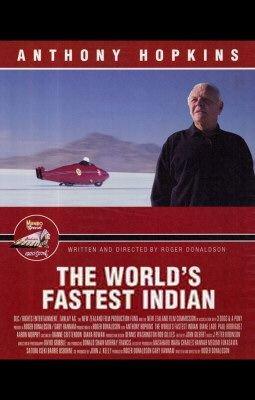
Before I begin to discuss Al Gore's An Inconvenient Truth, I should probably explain what it is that I do for a living. I'm a postdoctoral atmospheric scientist at Columbia University, and I do my research at NASA's Goddard Institute for Space Studies in New York City. GISS was set up initially in the early sixties for the study of planetary atmospheres, but over the years the research focus has shifted towards the earth's atmosphere in particular. The director of GISS, James Hansen, was the first scientist to testify before Congress about the need to address the issue of global warming -- indeed, a small portion of one of his appearances on Capitol Hill is included in the film. I study aerosols, which are airborne particles that absorb and scatter the sun's radiation. In addition to writing and publishing papers I have also engaged in a bit of public outreach, including giving a very similar PowerPoint presentation to the one the former Vice President gives during the movie. So I'm writing about the film not just as somebody who writes reviews for a hobby, but as somebody who studies climate for a living and who, like Gore, understands the need to present the science to the public more clearly that it has been done to date.
An Inconvenient Truth can be essentially broken into two sets of segments. The first set consists of Al Gore giving a public lecture, presumably at a university, about the basic science behind global warming and the greenhouse effect. Most of what Gore covers should have become common knowledge years ago; the fact that so little of the science is known by the public at large served as Gore's primary motivation for the lectures and the film. In a nutshell: the amount of carbon dioxide in the atmosphere has increased enormously since the start of the Industrial Revolution, carbon dioxide absorbs heat emitted by the earth and keeps heat within the planetary system, the earth's temperature is higher than it has been in at least a millennium, the rate of warming over the past twenty-five years in particular is completely unprecedented and defies any purely natural explanation, the resulting temperature rise is already affecting ecologically sensitive areas and will only affect more places in the future, storms could worsen, heat waves and droughts will increase, and sea levels will rise. Gore doesn't say anything that the overwhelming consensus of climate scientists would disagree with, and presents the science in a mostly clear and straightforward fashion. One part I thought was presented in a misleading manner, though, was the graph showing carbon dioxide levels back through the earth's history and the corresponding surface temperature values of the earth. Gore makes note of the close correlation of the two in a way that implies that it results from a simple cause-and-effect relationship, but there are at least a few historical examples where the carbon dioxide increase actually lags a bit behind the start of the temperature rise.
The second set of segments deals with Gore's personal history and the development of his environmental conscience. The most poignant of these deals with how the Gore family remained in denial about the health effects of the tobacco they grew on their farm until Gore's sister died from lung cancer. Gore effectively compares this situation with the refusal of the American public in general to acknowledge the severity of the global warming threat. Many of these segments did not really appear relevant to the global warming issue, though, and the movie rather curiously overlooks Gore's background in journalism. After all, Gore isn't actually doing any of the science discussed in the movie, he is reporting on it. Gore does point out, quite accurately, that much of the reporting on global warming in the media does not even acknowledge, much less reflect, the overwhelming consensus among the people who study climate. He should have taken some time at this moment to discuss a number of often repeated but easily refuted claims made by climate change skeptics in the media, but he regrettably lets the opportunity pass. The other segment that I felt could have been handled better was the footage of the dialogue between Gore and James Hansen at a 1989 Senate hearing in which Hansen testified. The clip used in the film shows Gore doing most of the talking. Perhaps I'm taking it a bit personally because Dr. Hansen happens to be my boss, but it would have been proper for the filmmakers to present different footage from that hearing that portrayed Gore as more of a listener.
All criticisms aside, An Inconvenient Truth does present the basic scientific evidence explaining why the earth is indeed getting warmer due to human influences on the atmosphere. Everybody should know at least as much science as Gore presents in this movie, and for that reason alone I would have to recommend it strongly. For more detailed, but readily digestible, scientific information on climate, I'd have to recommend checking out the RealClimate blog. (For the sake of disclosure, one of my colleagues at GISS is directly involved with RealClimate.)
Overall grade: B




































